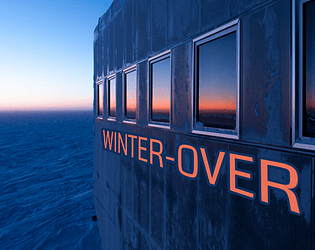After enjoying The Killings in Wasacona (KIW) so much, I got wind that another Twine IFComp game, Winter-Over by Emery Joyce and N. Cormier, might present a similar experience, and a comparable one for reviewing purposes. It does and it does. Were you to read no more of this review, what I would say about Winter-Over is that it's fairly dense and challenging on various fronts, and even with the help of its excellent auto-taking Notes feature and character summaries, it's probably best approached not in a hurry, and with mental resources to spare.
The game's sublimely atmopsheric cover image is a real photograph that looks unreal, and this primes the player to enter the strangely cloistered reality of Pickering Station in Antarctica. The PC is Pickering's "mechanic, handyman, and general jack-of-all-trades", and they've brought along their somewhat edgy brother, Daniel. This makes for a complement of about fourteen working at the station, a mixture of men and women, scientists and maintenance staff. When one of them murders Daniel, the PC is driven to try to solve the case themselves because the New Zealand Police are ten days away.
The game's title refers to Winter-over syndrome, a kind of stir craziness particular to workers enduring the long (two thirds of the year) winters at the Earth's poles. The irritableness, depression and aggression from the syndrome potentially affects the behaviour of all the characters in this game. Having paranoid characters trapped in a dangerous situation in the Antarctic immediately recalls John Carpenter's film The Thing (1982), and the game acknowledges this and dispenses with any need to dwell on it by having copies of both The Thing and its same-named 2011 prequel present in the game's rec room video library. This gesture says: You know about The Thing, we know about The Thing. Let's just continue.
Winter-Over (WO) presents as a more cerebrally veiled mystery than KIW. This grows out of its more restricted setting, and the fact that its PC is not letting on, while questioning suspects, that Daniel's death is suspicious. It's being passed off as an accident. Characters and geography tended to be tied together in KIW. You would explore the map, meet different characters and speak to them on their own turf about their experiences. Memories were easier to anchor because each interviewee could be visualised in a particular place. In WO, all the characters work and live together in a finite space. Their work is interconnected. They are not met in discrete venues but roam the station. You will meet almost every character in every location at some point. In fact, a challenge is just working out where particular characters will be at given times when you need to speak to them. It is all challenging; remembering who's who, what to go back and ask someone about, or whom to spend more time with to butter them up. These elements would allow a player to investigate smarter on a replay, though.
WO also offers considerably less commentary on physical environment than KIW, which makes sense as WO's environment is closed and more uniform. This puts the focus on the character dialogue and the PC's thoughts on their interactions. It's a tricky balance keeping dialogue sufficiently lively while also indulging enough repetition that the player can grab onto some routines. While it is a bit drab to be given the exact same questions to ask every major NPC, it means the answers can be more easily compared, even as a samey feeling does threaten the first few questioning sessions.
The characters perhaps need more tics to enable them or their interrelated pecadilloes to be distinguished in the long run. Again, it's tough when they have to frame themselves almost without action, just by responding to similar questions asked repeatedly. It is exciting when you find something that will allow you to goad more out of someone you've already met, whether that something is revelations from a security camera, info about their medical problems or evidence of their handedness (the killer was not a lefty). But just finding a target character can be tough. If you haven't developed their schedule, which is collated for you in the automated Notes section as you play, you can spend many game days trying to encounter them again.
There is some dense plotting in WO, and while I always enjoyed learning new things during play, and feeling the tension of the looming deadline, events often felt like they were floating away from me. I couldn't find people I needed to find, or the PC would become too sleepy and need to take a break, or an exciting one-off event would occur (e.g. the lights go out) that would interrupt both my physical progress and train of thought.
Perhaps this is all less stressful if you consider, going in, that you might need to play again. Given the level of detailed I uncovered, I wasn't sure if I'd be prepared to try again (at least during IFComp) if I didn't succeed. The thought was more stressful than warming. I'd not acquired a sense of how important saving the game would be, either. Maybe I still don't have one. I don't think you can die during the investigation, but can you identify any landmark moments? The investigation is all cumulative. And there is ultimately a lot to enjoy, from the mystery and revelations, and the claustrophobic atmosphere, to the odd violent shock or attack upon the PC.
Comparing it to the broadly similar KIW, I enjoyed KIW more for its varied presentation of characters and the possibilities presented by its skill system, but both games offer a stiff mystery challenge coupled with a lot of helpful features. Both can be replayed. I think KIW offers more replay appeal.

No comments:
Post a Comment